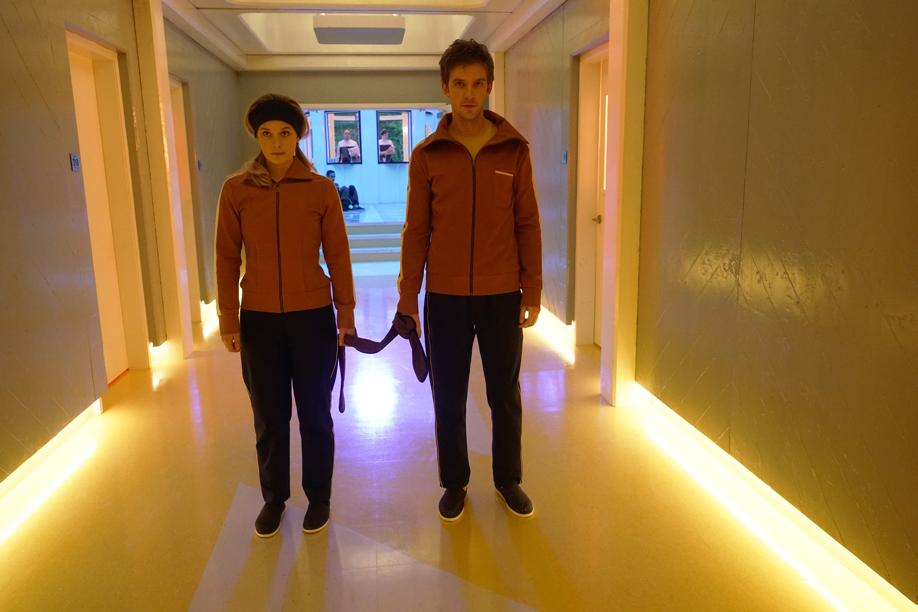
The new FX series “Legion’’ is a superhero series — or a super-antihero series, it’s hard to tell at first. Actor Dan Stevens travels miles from the highly civilized world of “Downton Abbey,’’ on which he played Matthew Crawley, to a place where teacups fly and frocks look suspiciously like straitjackets. He plays David Haller, a peaked, confused man who’s in a psychiatric hospital for paranoid schizophrenia, but who has as-yet unharnessed telekinetic abilities. Based on the Marvel Comics character Legion, he’s an X-Men mutant whose mission is still unclear to us, and to him.
But “Legion’’ looks and behaves nothing like the comic book TV series and movies we’ve been deluged by in recent years, with their tights and capes, their moody Gotham-esque cityscapes, and their black-and-white slant on heroism. Created by Noah Hawley of FX’s “Fargo,’’ the show unfolds like a kaleidoscopic vision of madness and fear, where it’s hard to distinguish dreams from reality, good guys from bad guys, past from present. It’s a visual fantasia, a morass of dance sequences, pictures brought to life from a violent children’s book, an empty swimming pool that leads to secret rooms, and a friend who may be a ghost. It is a muddle, a beautifully styled, scary, and withholding muddle that can’t easily be placed in a specific time period.
The idea is that we are experiencing David’s reality as David himself experiences it. Hawley is putting the viewers through the same disorientation, as we ponder whether David is mentally ill, gifted, or both. When he meets and instantly falls in love with a woman named — no kidding — Syd Barrett, we, like him, aren’t altogether sure she truly exists. The show has an “Inception’’-like resistance to easy understanding, not least of all as we travel with David while he physically interacts with moments from his past — the “museum of you,’’ as another mutant puts it. “Legion’’ is an origin story, a genre that usually explains things, but after three episodes of the series you may still be somewhat mystified about our hero.
Hawley isn’t the first to traffic in inscrutable logic, enigmatic imagery, and nonlinear narrative, of course. A number of shows and movies have taken the same kind of hallucinogenic approach to storytelling, throwing viewers into confusion and — when well-done, as in “Legion’’ — wonderment. At times, they make you feel as if you’re watching a particularly opaque MTV video — or even the title sequence of a show such as “Homeland’’ — flooded with seemingly random symbols and obstinate meanings. During “Legion,’’ I thought of David Cronenberg’s similarly trippy adaptation of William S. Burroughs’s “Naked Lunch,’’ I thought of a few Federico Fellini movies, I thought of Adrian Lyne’s surreal “Jacob’s Ladder.’’ They all deny literal interpretations.
Two of the clearest recent examples of Trippy TV are “Mr. Robot’’ and “Westworld.’’ Both dramas walk the fine line between mind-bending and dumbfounding, ultimately forcing viewers to trust that the writers and directors know what they’re doing. “Mr. Robot’’ can be especially cryptic as, like “Legion,’’ it puts us inside the mind of a seriously troubled individual, Rami Malek’s Elliot Alderson. We don’t quite know who and what exist and who and what don’t on the show, as Eliott struggles with his mental illness. “Westworld’’ doesn’t dive deep into visual effects, but it also works to perplex, particularly when it comes to timeframes.
Comedies, too, dabble in trippiness, although usually the goal isn’t to throw viewers off balance so much as to concisely illustrate what’s going on in the characters’ minds. Maria Bamford’s “Lady Dynamite’’ shows us Maria’s consciousness, after her months in treatment for bipolar disorder, but only periodically, with nonlinear events, visions, and meta-bits. But we know the general narrative outline of the show, which we don’t on “Legion.’’ Likewise, “Man Seeking Woman’’ takes the surrealistic flashes of “Scrubs’’ and runs with them, so that the flashes are more like long, elaborate diversions that can last for big chunks of the episodes. The show is comprehensible, even if the surreal sequences are psychedelic.
I’m hoping “Legion’’ will become more coherent as David begins to better understand his powers. And given Hawley’s record with “Fargo,’’ one of TV’s best dramas, my hopes are probably not in vain. At some point during the trippy flight, with its clouded meanings, the plane will need to land.
Matthew Gilbert can be reached at gilbert@globe.com. Follow him on Twitter @MatthewGilbert.



